G20 in Pittsburgh: where in the world are we going now?
Sep 24th, 2009 | By Counterweights Editors | Category: In Brief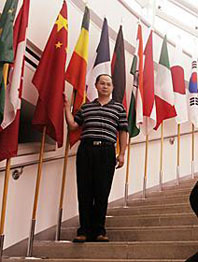
Huiyu Zheng of the Chinese delegation visiting Pittsburgh for the G20 Summit, poses with the Chinese flag on the steps of the welcome center at Phipps Conservatory and Botanical Gardens, September 23. Doug Oster/Post-Gazette.
PITTSBURGH, PA. THURSDAY, SEPTEMBER 24, 2009. [UPDATED SEPTEMBER 25 and SEPTEMBER 26].What is the G20 that is meeting today and tomorrow in this reviving old US rust-belt city on the site of the mid 18th century French Fort Duquesne, at the junction of the Allegheny, Monongahela, and Ohio rivers?
Well … to start with it is the third recent gathering of leaders from the largest national economies, held to deal with the global financial crisis that suddenly fell from somewhere about a year ago now. The first meeting was in Washington, DC in mid November 2008. The second was in London in early April 2009 – and it featured a $1.1 trillion “stimulus package” that some now argue “was instrumental in keeping the world from plunging into a full-blown depression..”
President Obama is hosting the third of these meetings today and tomorrow in Pittsburgh. He is urging the need for some re-balancing of the world economy: “We can’t go back to the era where the Chinese or the Germans or other countries just are selling everything to us, we’re taking out a bunch of credit card debt or home equity loans, but we’re not selling anything to them.”
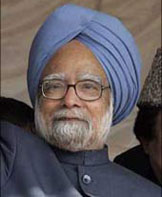
Prime Minister Manmohan Singh of India “will be flying for more than 30 hours ... to attend the third summit of G-20 countries in Pittsburgh in the United States.”
And then there are “hawks” and “doves” on “financial regulatory reform.” The hawks include France and Germany, who “want caps on the pay of bankers and other financiers. They want to link pay to long-term results and to ‘claw back’ bonuses from executives whose risky investments go sour.” Strangely enough, it seems that President “Obama, always at pains not to appear engaged in ‘class warfare,’ is among the ‘doves’.”
Another perhaps more widely shared concern involves effective “exit strategies” for the international and domestic stimulus packages, that have figured in so much recent economic recovery policy. And then there is climate change and the world economy. The big date here is at Copenhagen, Denmark in December. But: “In Pittsburgh …Â there will be at least some scene-setting for the later hard bargaining in the Danish capital.”
The Age in Australia has nicely summarized the immediate main point: In Pittsburgh today and tomorrow the G20 leaders, whatever their ultimate future, will be wrestling “some of the most difficult issues in 50 years.” At least the worst insomniacs among us will all be watching, to see how close they may or may not come to wrestling these issues to the ground! [Read more below for SEPTEMBER 25 AND 26 UPDATES].
Canada’s role: past and future …
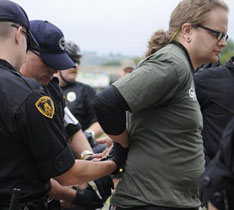
Protesting the G20 in Pittsburgh: One of five Greenpeace activists is handcuffed in Point State Park after being arrested for attempting to hang a banner off the Fort Pitt Bridge, September 23.. Pam Panchak / Post-Gazette.
[SEE ALSO SEPTEMBER 25 AND 26 UPDATES BELOW]. So … exactly what countries are involved, anyway? In alphabetical order: Argentina, Australia, Brazil, Canada, China, France, Germany, India, Indonesia, Italy, Japan, Mexico, Russia, Saudi Arabia, South Africa, South Korea, Turkey, United Kingdom, United States, and the European Union – along with assorted officials of the International Monetary Fund and the World Bank, “on an ex-officio basis.”
Canada, believe it or not, was an early booster of the G20, when it was just a gathering of finance ministers, in the wake of the late 1990s Asian financial crisis. The idea was to include the new players in the world economy that had become too important to ignore in critical global economic debate.
When it began in 1999 this early G20 was “chaired for its first two years by Canadian Finance Minister Paul Martin.” It is only since the Washington meeting last November that the G20 has at least temporarily involved heads of governments – in a kind of expansion of the older G8 leading world economies (United States, Japan, Germany, France, United Kingdom, Italy, Russia, and Canada).
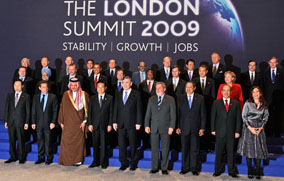
Summit host British Prime Minister Gordon Brown, front row centre, stands with the other G20 leaders during a group photo at the G20 Summit in the Excel centre in London, Thursday, April 2, 2009. Oddly enough Canadian Prime Minister Stephen Harper does not appear to be in this photo. He was apparently in the washroom, or loo as they say in the UK . (AP / Kirsty Wigglesworth).
Will the G20, which includes, e.g., the rising stars of China and India, come to replace the more compact but increasingly unrepresentative G8, as the major international economic management forum (or whatever the more helpful and exact term is)?
As fate would have it, Canada which is hosting next year’s G8 meeting, could have at least some influence on this question. If, as host, it invites all the current G20 members to the next G8 meeting, that could lend a lot of weight to any drive towards having the G20 replace the G8 for all practical purposes.
Michael Ignatieff already seems to have signalled that this is what he would do if he were Liberal prime minister. Just what current Conservative Prime Minister Stephen Harper would do is apparently not yet entirely clear. (And there are many sides to the argument, no doubt.) It is a bit of a shame that the former Liberal minority prime minister, Paul Martin, who did so much to promote the early G20 concept in the face of much scepticism, at home and abroad, will not be able to pull what few levers Canada has on the fate of the concept now.
UPDATE SEPTEMBER 25, 12 Noon EDT: This just in [from the Globe and Mail in Toronto]: “Prime Minister Stephen Harper announced Canada will host a transition summit next year –Â technically two summits back to back –Â that will mark the shift of power from a club of wealthy nations to the major developing powers like China, India, and Brazil.
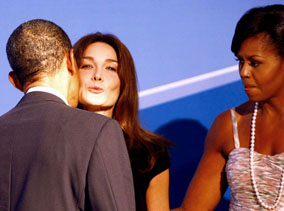
President Obama greets Carla Bruni, wife of French President Sarkozy, before the opening dinner for G20 leaders in Pittsburgh – as US First Lady looks on (making you wonder a bit just how much trouble the President might be in later ... but not seriously, of course)!
“Canada will still host a G8 summit in Muskoka next June, but a broader club, the Group of 20, is now officially superseding it as the world’s major economic forum, so a G20 summit will tacked alongside it. Officials said the G20 is also expected to be in and around Muskoka, but it’s not clear if it will be before or after the G8 …
“The decision to make the G20 the real power club was formalized at a dinner of G20 leaders at their summit in Pittsburgh last night …
“South Korea was to host the next G20 summit in April; but because of the transition from G8 to G20, and two summits piling up in quick succession, that has been postponed to November. Mr. Harper asked South Korean President Lee Myung-bak to co-chair the G-20 portion of the summit in Canada.”
For further details see: “As banking regulation nears, G20 to take over from G8” ; “Global Economic Forum to Expand Permanently” ; and “Reflecting New Global Economic Order, More Expansive G-20 to Replace G-8.” And note this more general observation from the Washington Post: “Despite … [an] upbeat report from US officials, expectations for the summit remained modest. G20 leaders already agreed to sidestep the thorny issue of when to begin withdrawing the hundreds of billions of dollars spent to jump-start their economies. Nor were they expected to commit huge new sums of money as they did in April, when they agreed to triple the IMF’s resources. Instead, attendees cast this meeting as a moment to take stock of what they have done and to discuss how to avoid similar crises in the future.”
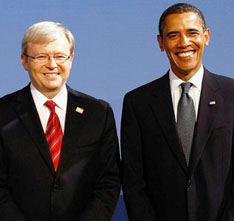
President Obama with Australian Prime Minister Kevin Rudd, somewhere in Pittsburgh. (Mcnamee/Pool/EPA).
Finally, Canada is not the only former self-governing British dominion to claim some role in the imminent switch from G8 to G20. See this report from The Age in Melbourne: “Major win for Australia as G20 permanently replaces the G8 … For Prime Minister Kevin Rudd, it was the culmination of a nearly two-year campaign to convince larger nations to support the broader body, which includes China, India, Brazil, Indonesia and other developing nations … He is believed to have won over US President Barack Obama some weeks ago, and on Thursday, he and South Korean President Lee Myung-Bak made presentations to leaders in Pittsburgh to seal the deal.” (And why, some might ask, does the London TimesOnLine Pittsburgh G20 photo gallery have no photos at all of Canadian Prime Minister Stephen Harper?)
UPDATE SEPTEMBER 26: The Preamble to the final Leaders’ Statement from the “Pittsburgh Summit” suggests what the G20 members themselves at least hoped they accomplished at this important enough international meeting (that probably does at least mark a turning point in the institutional evolution of the world economy– away from the old “Triad” of Western Europe, North America, and Japan, and towards a more inclusive regime which also includes such rising places as China, India, Brazil, Turkey, and South Africa):
Background
1. We meet in the midst of a critical transition from crisis to recovery to turn the page on an era of irresponsibility and to adopt a set of policies, regulations and reforms to meet the needs of the 21st century global economy.
2. When we last gathered in April, we confronted the greatest challenge to the world economy in our generation.
3. Global output was contracting at pace not seen since the 1930s. Trade was plummeting. Jobs were disappearing rapidly. Our people worried that the world was on the edge of a depression.
4. At that time, our countries agreed to do everything necessary to ensure recovery, to repair our financial systems and to maintain the global flow of capital.
5. It worked.
6. Our forceful response helped stop the dangerous, sharp decline in global activity and stabilize financial markets. Industrial output is now rising in nearly all our economies. International trade is starting to recover. Our financial institutions are raising needed capital, financial markets are showing a willingness to invest and lend, and confidence has improved.
7. Today, we reviewed the progress we have made since the London Summit in April. Our national commitments to restore growth resulted in the largest and most coordinated fiscal and monetary stimulus ever undertaken. We acted together to increase dramatically the resources necessary to stop the crisis from spreading around the world. We took steps to fix the broken regulatory system and started to implement sweeping reforms to reduce the risk that financial excesses will again destabilize the global economy.
8. A sense of normalcy should not lead to complacency.
9. The process of recovery and repair remains incomplete. In many countries, unemployment remains unacceptably high. The conditions for a recovery of private demand are not yet fully in place. We cannot rest until the global economy is restored to full health, and hard-working families the world over can find decent jobs.
10. We pledge today to sustain our strong policy response until a durable recovery is secured. We will act to ensure that when growth returns, jobs do too. We will avoid any premature withdrawal of stimulus. At the same time, we will prepare our exit strategies and, when the time is right, withdraw our extraordinary policy support in a cooperative and coordinated way, maintaining our commitment to fiscal responsibility.
11. Even as the work of recovery continues, we pledge to adopt the policies needed to lay the foundation for strong, sustained and balanced growth in the 21st century. We recognize that we have to act forcefully to overcome the legacy of the recent, severe global economic crisis and to help people cope with the consequences of this crisis. We want growth without cycles of boom and bust and markets that foster responsibility not recklessness.
What They Agreed
12. Today we agreed:
13. To launch a framework that lays out the policies and the way we act together to generate strong, sustainable and balanced global growth. We need a durable recovery that creates the good jobs our people need.
14. We need to shift from public to private sources of demand, establish a pattern of growth across countries that is more sustainable and balanced, and reduce development imbalances. We pledge to avoid destabilizing booms and busts in asset and credit prices and adopt macroeconomic policies, consistent with price stability, that promote adequate and balanced global demand. We will also make decisive progress on structural reforms that foster private demand and strengthen long-run growth potential.
15. Our Framework for Strong, Sustainable and Balanced Growth is a compact that commits us to work together to assess how our policies fit together, to evaluate whether they are collectively consistent with more sustainable and balanced growth, and to act as necessary to meet our common objectives.
16. To make sure our regulatory system for banks and other financial firms reins in the excesses that led to the crisis. Where reckless behavior and a lack of responsibility led to crisis, we will not allow a return to banking as usual.
17. We committed to act together to raise capital standards, to implement strong international compensation standards aimed at ending practices that lead to excessive risk-taking, to improve the over-the-counter derivatives market and to create more powerful tools to hold large global firms to account for the risks they take. Standards for large global financial firms should be commensurate with the cost of their failure. For all these reforms, we have set for ourselves strict and precise timetables.
18. To reform the global architecture to meet the needs of the 21st century. After this crisis, critical players need to be at the table and fully vested in our institutions to allow us to cooperate to lay the foundation for strong, sustainable and balanced growth.
19. We designated the G-20 to be the premier forum for our international economic cooperation. We established the Financial Stability Board (FSB) to include major emerging economies and welcome its efforts to coordinate and monitor progress in strengthening financial regulation.
20. We are committed to a shift in International Monetary Fund (IMF) quota share to dynamic emerging markets and developing countries of at least 5% from over-represented countries to under-represented countries using the current quota formula as the basis to work from. Today we have delivered on our promise to contribute over $500 billion to a renewed and expanded IMF New Arrangements to Borrow (NAB).
21. We stressed the importance of adopting a dynamic formula at the World Bank which primarily reflects countries’ evolving economic weight and the World Bank’s development mission, and that generates an increase of at least 3% of voting power for developing and transition countries, to the benefit of under-represented countries. While recognizing that over-represented countries will make a contribution, it will be important to protect the voting power of the smallest poor countries. We called on the World Bank to play a leading role in responding to problems whose nature requires globally coordinated action, such as climate change and food security, and agreed that the World Bank and the regional development banks should have sufficient resources to address these challenges and fulfill their mandates.
22. To take new steps to increase access to food, fuel and finance among the world’s poorest while clamping down on illicit outflows. Steps to reduce the development gap can be a potent driver of global growth.
23. Over four billion people remain undereducated, ill-equipped with capital and technology, and insufficiently integrated into the global economy. We need to work together to make the policy and institutional changes needed to accelerate the convergence of living standards and productivity in developing and emerging economies to the levels of the advanced economies. To start, we call on the World Bank to develop a new trust fund to support the new Food Security Initiative for low-income countries announced last summer. We will increase, on a voluntary basis, funding for programs to bring clean affordable energy to the poorest, such as the Scaling Up Renewable Energy Program.
24. To phase out and rationalize over the medium term inefficient fossil fuel subsidies while providing targeted support for the poorest. Inefficient fossil fuel subsidies encourage wasteful consumption, reduce our energy security, impede investment in clean energy sources and undermine efforts to deal with the threat of climate change.
25. We call on our Energy and Finance Ministers to report to us their implementation strategies and timeline for acting to meet this critical commitment at our next meeting.
26. We will promote energy market transparency and market stability as part of our broader effort to avoid excessive volatility.
27. To maintain our openness and move toward greener, more sustainable growth.
28. We will fight protectionism. We are committed to bringing the Doha Round to a successful conclusion in 2010.
29. We will spare no effort to reach agreement in Copenhagen through the United Nations Framework Convention on Climate Change (UNFCCC) negotiations.
30. We warmly welcome the report by the Chair of the London Summit commissioned at our last meeting and published today.
31. Finally, we agreed to meet in Canada in June 2010 and in Korea in November 2010. We expect to meet annually thereafter and will meet in France in 2011.
For further detail see “Leaders’ Statement: The Pittsburgh Summit, September 24 — 25, 2009.”

